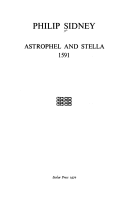Quotes from book
Astrophel and Stella

Probably composed in the 1580s, Philip Sidney's Astrophil and Stella is an English sonnet sequence containing 108 sonnets and 11 songs. The name derives from the two Greek words, 'aster' and 'phil' , and the Latin word 'stella' meaning star. Thus Astrophil is the star lover, and Stella is his star. Sidney partly nativized the key features of his Italian model Petrarch, including an ongoing but partly obscure narrative, the philosophical trappings of the poet in relation to love and desire, and musings on the art of poetic creation. Sidney also adopts the Petrarchan rhyme scheme, though he uses it with such freedom that fifteen variants are employed.Some have suggested that the love represented in the sequence may be a literal one as Sidney evidently connects Astrophil to himself and Stella to Lady Penelope Devereux, afterward Lady Rich. Sidney and Lady Penelope had been betrothed when the latter was a child. For some reason the match was broken off, and Lady Penelope married Lord Rich, with whom she lived for a while most unhappily. She is thought to be the Penelope Rich, the wife of Robert Rich, 3rd Baronet. Payne and Hunter suggest that modern criticism, though not explicitly rejecting this connection, leans more towards the viewpoint that writers happily create a poetic persona, artificial and distinct from themselves.

“Fool," said my muse to me. "Look in thy heart and write.”
Sonnet 1,Concluding couplet from Loving in truth,and fain in verse my love to show
Compare: "Look, then, into thine heart and write", Henry W. Longfellow, Voices of the Night, Prelude.
Variant: Biting my truant pen, beating myself for spite:
"Fool!" said my muse to me, "look in thy heart, and write.
Source: Astrophel and Stella (1591)
Context: .... But words came halting forth, wanting Invention's stay,
Invention, Nature's child, fled step-dame Study's blows,
And others' feet still seemed but strangers in my way.
Thus great with child to speak, and helpless in my throes,
Biting my truant pen, beating myself for spite:
"Fool," said my Muse to me, "look in thy heart and write."

“Have I caught my heav'nly jewel.”
Sonnet 1, Second Song. Note: Quoted by William Shakespeare in Merry Wives of Windsor.
Astrophel and Stella (1591)